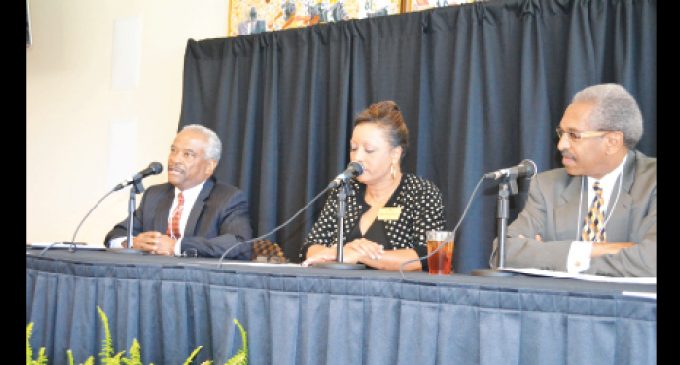Daylong symposium tackles future of diversity

Wake Forest University continued its ongoing discussion on diversity and inclusion on March 19 during a daylong symposium at Wake Forest University’s Bridger Field House.
Themed “Building our Institutional Capacity for Diversity and Inclusion: At a Glance,” the symposium, which was co-hosted by the North Carolina Diversity and Inclusion Partners, drew more than 150 attendees from across the state.
“This moment for us at Wake Forest recognizes our progress and the opportunities that lie ahead in building communities that leverage diversity effectively and empowering our constituents through inclusion,” stated Dr. Barbee Oakes, WFU assistant provost for Diversity and Inclusion and co-chair of the symposium’s planning committee. “This is the first time a symposium related to diversity and inclusion has been sponsored on the campus of Wake Forest University, but with the support of key administrators … we are confident this will not be our last.”
Marva Smalls, executive vice president of Global Inclusion Strategy for Viacom and chief of staff for Nickelodeon Networks Group served as keynote speaker. Smalls, a South Carolina native, said diversity and inclusion is an essential component of the television giant’s continued success worldwide.
“If we want them to tune in, log in, we must reflect the world in the way in which they experience it,” she said of global viewers. “…There is only one way to achieve this and that is making diversity and inclusion part of our DNA.”
The company also puts a big premium on generational diversity, which she said is often more challenging to achieve than cultural diversity.
“We have dramatic differences in our life experiences,” she said of the different generations. “…Given how different our experiences are, it’s no surprise that we bring different strengths and weaknesses to the workplace.”
Smalls reinforced the importance of the work attendees are doing in the field.
“It is vital that America’s colleges and universities find ways to strengthen their diversity efforts. It’s equally important that everyone hired … wants the challenge of working in an environment where most people are different from you,” she said. “This might sound like the future, but the future is now. This is our reality today.”
Oakes took part in the panel discussion “Diversity and Inclusion 50 Years After Integration: Where Do We Go from Here?,” a topic related to Wake Forest’s yearlong celebration of its acceptance of its first black student, Ed Reynolds. Moderator Dr. Melenie Lankau challenged Oakes and fellow panelists Frank Matthews, publisher and editor-in-chief of “Diverse: Issues in Higher Education” magazine and Dr. Benjamin Reese Jr., vice president of Institutional Equity at Duke University, to tackle the issues of recruiting diverse faculty members and creating an on-campus environment that embraces both inclusion and diversity.
Oakes said institutional support is imperative.
“One of the reasons that we have been so successful in such a short period of time at Wake Forest is that we have really developed a collaborative leadership structure. That’s been an important factor,” she said. “(And) you really have to be creative. You have to be a relationship oriented person… You can’t be successful in this work dictating polices. That whole compliance mentality doesn’t really work to change culture.”
Matthews said a common sense approach to the issue is needed. Simple tactics like deploying underrepresented faculty members to recruit other underrepresented staffers is a simple and effective method of increasing on-campus diversity.
“There’s really nothing new about this conversation,” he declared. “We know what we need to do.”
Reese told the audience about an initiative Duke has adopted that requires those in leadership positions in each department to develop their own diversity and inclusion programs.
“It engages every leader,” Reece said. “One of the interesting spinoffs of this is that people who haven’t given diversity and inclusion a single thought … they now have been pushed to think about what aligns with their work area.”
The symposium also included a meeting of the North Carolina Diversity and Inclusion Partners and an employer roundtable discussion with students in the university’s Reynolda Hall.












